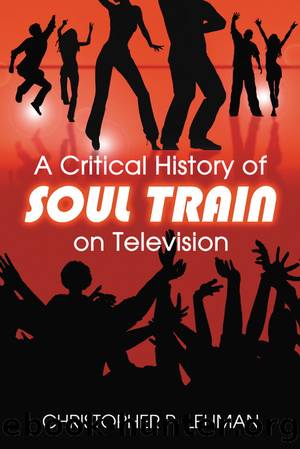A Critical History of Soul Train on Television by Christopher P. Lehman

Author:Christopher P. Lehman [Lehman, Christopher P.]
Language: eng
Format: epub
Tags: Social Science, Ethnic Studies, American, General, dance, African American & Black Studies, Performing Arts, General Fiction, Television
ISBN: 9780786436699
Google: XlWQBQAAQBAJ
Publisher: McFarland
Published: 2008-04-16T00:13:29.886539+00:00
6
âStill the Hippest Tripâ
Soul Train Loses Preeminence and Grows Older
In 1980 Soul Train began its second decade on a very high note. The series continued to feature R&B acts with successful crossover singles despite the disco backlash of the previous year. The show still attracted Hollywood stars for cameos; actresses Kim Fields of the NBC situation comedy The Facts of Life (1979â88) and Jayne Kennedy of the same networkâs âhuman interestâ show Speak Up, America (1980) made appearances in the 1980â81 season. The program also boasted a new theme song by The Whispers, which Cornelius used for three yearsâthe longest tenure for a theme since King Curtisâ âHot Potatoes.â
The same year, Cornelius himself enjoyed success in the entertainment industry outside of Soul Train. In June, United Artists released the movie Roadie to theaters. Reviewers were kind to the film. Variety stated that Cornelius âslickly embodiedâ his character, concert promoter Mohammed Johnson. The Los Angeles Times identified actors by name instead of the characters they played; it referred to the tour the title-character joined as âDon Corneliusâ Rock ânâ Roll Circus.â The critics accepted his portrayal of a character involved in âwhiteâ rock musicâquite an accomplishment, because to television audiences he still embodied âsoul,â not ârock.â1
Cornelius understood the limitations of his characterâs appeal and, therefore, did not exploit the movie on his television series. Roadie, after all, was a different kind of movie than Cleopatra Jones, which was a film marketed to African American audiences. In that movie Cornelius played himself, and he promoted the film by allowing an R&B singer to perform a song from it on Soul Train. In contrast, his program did not feature Meat Loaf, Alice Cooper, Blondie or any other musical act from the ârock ânâ roll movieâ as guest stars. Pop music had effectively become re-segregated. Whereas only five years earlier, three white acts boarded the âtrain,â only Teena Marie crossed the musical color line onto Soul Train in the 1980â81 season.
Cornelius did promote movies as the decade beganâjust not his own. Moreover, he booked acts that had worked in major motion picture releases, not just those targeted to urban demographics. In 1980, Irene Cara sang the theme to her movie Fame. The film presented an ethnically diverse group of students pursuing stardom while training at the New York High School of the Performing Arts. Soul Trainâs promotion of the movie was ironic, considering that high school students once performed on the television show and sought fame from television exposure.
Another large-budget movie Soul Train promoted did not fare as well as Fame. In 1980 the Village People performed the theme to their movie Canât Stop the Music. The members starred as themselvesâstereotypical male iconsâand fictitiously depicted their rise to fame; the other leading characters were white. Few people saw the film. It was released one year after Chicagoâs âDisco Sucksâ rally, and the movie did not have major stars or well-respected actors supporting the group. The studio had merely counted on disco music and the Village People to draw the audiences.
Download
This site does not store any files on its server. We only index and link to content provided by other sites. Please contact the content providers to delete copyright contents if any and email us, we'll remove relevant links or contents immediately.
Kathy Andrews Collection by Kathy Andrews(11839)
The remains of the day by Kazuo Ishiguro(9002)
Spare by Prince Harry The Duke of Sussex(5200)
Paper Towns by Green John(5194)
The Body: A Guide for Occupants by Bill Bryson(5100)
Industrial Automation from Scratch: A hands-on guide to using sensors, actuators, PLCs, HMIs, and SCADA to automate industrial processes by Olushola Akande(5063)
Machine Learning at Scale with H2O by Gregory Keys | David Whiting(4314)
Be in a Treehouse by Pete Nelson(4055)
Never by Ken Follett(3960)
Harry Potter and the Goblet Of Fire by J.K. Rowling(3864)
Goodbye Paradise(3812)
The Remains of the Day by Kazuo Ishiguro(3414)
Into Thin Air by Jon Krakauer(3402)
Fairy Tale by Stephen King(3401)
The Cellar by Natasha Preston(3347)
The Genius of Japanese Carpentry by Azby Brown(3310)
120 Days of Sodom by Marquis de Sade(3276)
Reminders of Him: A Novel by Colleen Hoover(3125)
Drawing Shortcuts: Developing Quick Drawing Skills Using Today's Technology by Leggitt Jim(3084)
